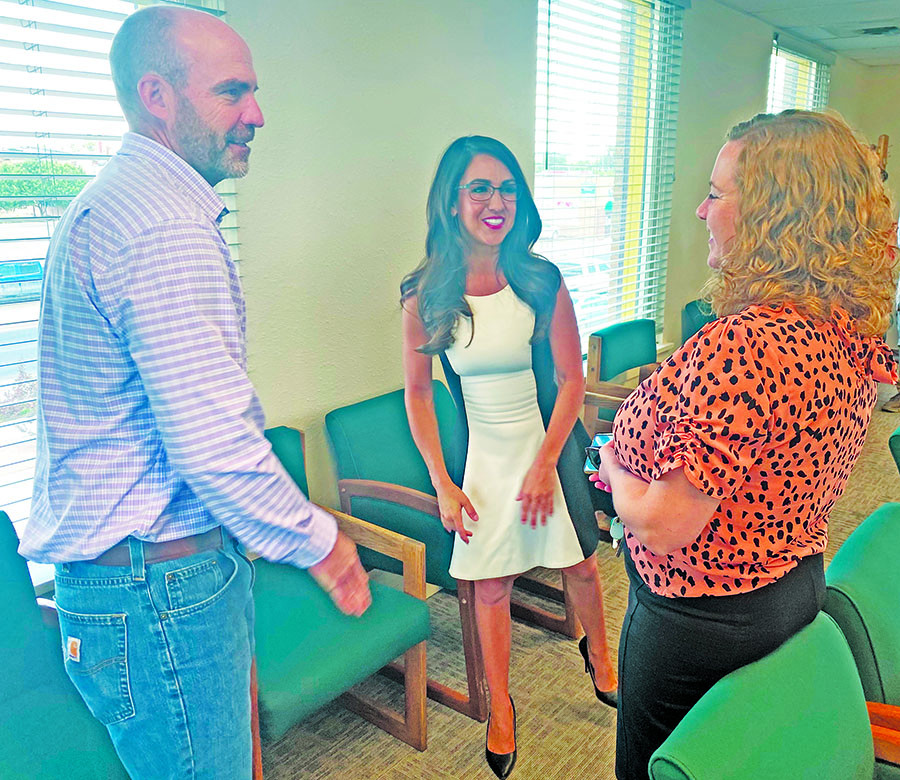Representative Boebert tours the San Luis Valley

ALAMOSA — Congresswoman Lauren Boebert (R-CO-3) was in the San Luis Valley and met with farmers, academics, and policymakers on Aug. 8.
At an informal visit at the San Luis Valley Council of Governments in Alamosa, Boebert spent about 30 minutes listening to the concerns of officials before heading to another meeting with officials.
After discussing the $20 million in earmarks she has brought to the district (none in the Valley),
the congresswoman said that in the 2.5 years she has been in office, she has secured a total of $303.5 million for the district.
Boebert mentioned the importance of grant writers, especially to obtain federal grants. The consensus in the room was that no local government has the funding for a grant writer.
Boebert said, "For any [federal] grants let us know so we can write a letter of support."
Sarah Stoeber, executive director of the Council of Governments, offered, "That has been the challenge, because there is so much federal money becoming available, we have projects that certainly would fit the needs of the region, but we need somebody [grant writer] to do the work."
"The challenge with federal grants is that they are so paperwork heavy, the intensity and the time it takes to fill them out, and the reporting after the fact. If you guys can take a look at streamlining this, maybe think more at block grants and have the states dole out the funding," added Gigi Dennis, Monte Vista city manager."
Boebert responded with, "That is why most of the grants and funding goes to urban areas and cities because they can afford the grant writers and they can afford to get through the regulations and keep up with the paperwork, and the reporting; and therefore, they receive the funds and here are these rural areas without.
"We're all for deregulation trying to cut red tape, unfortunately not everyone shares my sentiment in Washington D.C., but happy to keep that conversation going and move it forward," said Boebert.
Regarding the process of obtaining federal grants and grant writing, Boebert said, “maybe this can be a bipartisan effort to make it easier on the American people."
"The difference between the last congress and this congress is that during the speaker race (Kevin McCarthy (R-CA-20 was picked), we changed the way the process of earmark and community funding takes place. I said continually, this is the way Congress should allocate funds. Representatives who know their districts should be able to put in requests and fund certain projects," said Boebert in response to Dennis, who asked the Congresswoman to explain her change from being opposed to earmarks to in favor of them. "We were seeing so much waste, fraud and abuse and frivolous spending and out-of-control spending with these earmarks. It was not something I could get behind. In the speaker race, we changed the way we vote on them, the way that they are approved, what they can be spent on; it made me a lot more comfortable submitting so-called earmarks and that is why this year I'm accepting requests."
Rachel James, director of development services with the City of Alamosa, mentioned the Rio Grande Levee restoration project, "Just to get this on your radar on this horrible, horrible project because we are stuck between the Army Corp [United States Army Corps of Engineers] and FEMA [Federal Emergency Management Agency] and FEMA is going to decertify our levee and everyone in Alamosa will end up paying for flood insurance."
Boebert responded she had been given a tour of a community farm earlier in the day and she is aware of the levee issue.
Alamosa County Counselor Vern Heersink said of the levee, "On the one hand we have to protect against floods, and on the other, we are faced with drought, and we are anticipating less agriculture in the future. We need to be researching and find new crops where farmers can have some sort of income."



